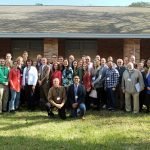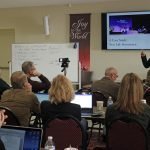 Contemporary worship songs and services have often been the subject of scrutiny and critique, but songs and services have rarely been studied in tandem with one another. In the January 2019 seminar, Worship and Eschatology: A Study of Hope in Contemporary Worship, Dr. Glenn Packiam examined the eschatological quality of contemporary worship by exploring how Christian hope is encoded and experienced in worship songs and services.
Contemporary worship songs and services have often been the subject of scrutiny and critique, but songs and services have rarely been studied in tandem with one another. In the January 2019 seminar, Worship and Eschatology: A Study of Hope in Contemporary Worship, Dr. Glenn Packiam examined the eschatological quality of contemporary worship by exploring how Christian hope is encoded and experienced in worship songs and services.
Audio files from each of the seminar sessions are available below to stream or download.
Session 1—What is the Purpose of Congregational Worship?
Based on a brief overview of literature on contemporary worship from practitioners and theoreticians alike, three broad paradigms emerge: mission, formation, and encounter. Each of these paradigms shape the language and the approach to worship design, songwriting, worship leading, and preaching, and none is sufficient on its own.
The Purpose of Congregational Worship [Download audio, 53:03]
Session 2—Praxis and Discussion
This session focuses on creative ways to shape services based on the three paradigms presented above, and includes specific action items for preachers, worship designers, and songwriters. A case study from New Life Downtown is examined including the story of Glenn’s journey and the missteps that occurred in implementing a liturgical framework in an evangelical context.
Worship Praxis [Download audio, 57:59]
Session 3—What is Christian Hope?
Drawing on five models of hope, a working definition of creedal Christian hope is established in this session. The cognitive model identifies hope as a positive motivational state based on a favorable appraisal of both agency and pathway. The affective model demonstrates how hopeful feelings arise. The virtue-ethics model forms connections between emotion and character, allowing hope to become a habit. The phenomenological model provides a structural analysis of hope in terms of its subject, object, grounds, and act. Finally, the theological model calls to attention the time and space dimensions of hope. Taking the models together, we arrive at a working definition for creedal Christian hope in the contemporary context.
What Is Christian Hope? [Download audio, 53:36]
Session 4—What Do Evangelicals Sing When They Sing About Hope?
Dr. Packiam analyzes the aggregated responses of national worship leaders to questions about songs of hope. The findings were cross-referenced with responses from two evangelical megachurches—a Presbyterian church in Denver and a Charismatic church in Dallas—to see if the patterns on a national scale play out on the local level. Explanations to account for the research findings are explored.
What Do Evangelicals Sing When They Sing About Hope? [Download audio, 57:32]
Session 5—Emotion, Experience, and the Presence of God
This session takes in-depth look at the paradigm of encounter. Because of the ubiquity of contemporary worship and because it has been said to carry a Pentecostal “genetic code” (Lester Ruth), it is worth exploring the sociological, psychological, and theological dimensions of emotion and experience—two identifiable features of contemporary worship.
Emotion, Experience and the Presence of God [Download audio, 49:42]
Emotion and Music, Formation and Worship [Download audio, 37:01]
Music embodies, evokes and educates emotion.
Session 6—Experiencing Hope in Worship
Since a song and a worship service are not the same thing, in-depth fieldwork is important. Based on participant observation, interviews, and the narrated experiences of hope from focus groups in two evangelical megachurches, this session compares the research with literature from the social sciences on ritual, emotion, and collective behavior. Four key observations emerge.
Experiencing Hope In Worship [Download audio, 29:48]
Session 7—The Spirit of Hope
There is an undeniable inconsistency between the anemic theology of hope encoded in contemporary worship songs and the rich experience of hope in contemporary worship services. In this session, Glenn Packiam proposes a robust theology of the Spirit that addresses this incongruity and makes the essential link between the text of contemporary worship songs and the performance of the ‘ritual’.
The Spirit of Hope [Download audio, 48:02]
Session 8—A Charge to Pastors, Worship Leaders, and Songwriters
The notion that the Spirit meets us with hope despite the lack of a robust eschatological content in contemporary worship music has resulted in the writing of poor, theologically deficient songs. This session unpacks three practical recommendations for church leaders—especially preachers, songwriters, worship leaders and worship design teams.
“God’s kindness is not an excuse for our sloppiness.”
A Charge to Pastors, Worship Leaders, and Songwriters [Download audio, 46:26]
Glenn Packiam describes his impression of IWS:
 “IWS swims in the convergence of several important streams in the Body of Christ. Holding together the Scripture, Sacrament, and Spirit, the courses and seminars offered at IWS train pastors and worship leaders to be rooted and reflective leaders. My experience teaching a seminar here introduced me to a caliber of student that knows how to blend inter-disciplinary learning with ministry praxis. Moreover, the leadership of this institution have shepherd’s hearts, caring for students and preparing them well for leadership in the local church.”
“IWS swims in the convergence of several important streams in the Body of Christ. Holding together the Scripture, Sacrament, and Spirit, the courses and seminars offered at IWS train pastors and worship leaders to be rooted and reflective leaders. My experience teaching a seminar here introduced me to a caliber of student that knows how to blend inter-disciplinary learning with ministry praxis. Moreover, the leadership of this institution have shepherd’s hearts, caring for students and preparing them well for leadership in the local church.”
See more photos from the Glenn Packiam event at IWS. Click here for the Seminar Photo Gallery.



